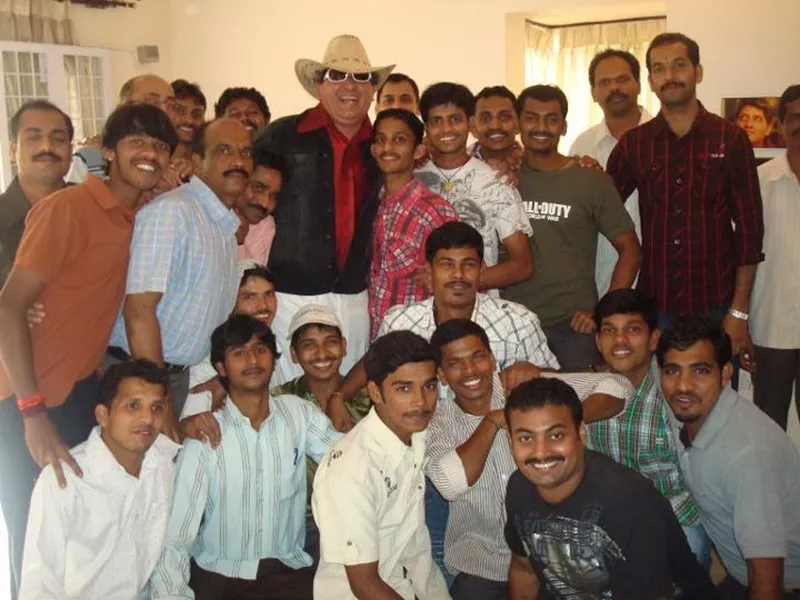Mangalore Pearl's secret to success: a founder who goes to the market at 5:15 AM every day to buy fresh seafood
Started in Bengaluru in 2004, Steven Pinto's Rs 3 crore turnover Mangalore Pearl restaurant has two outlets in the city and serves seafood made in the traditional Mangalore Catholic style.

Steven Pinto, Founder, Mangalore Pearl
Since childhood, Steven Pinto was passionate about cooking. He was especially fascinated with seafood dishes like fish curry, which was the staple diet for his Catholic community in Mangalore.
Mangalore Catholic seafood dishes, especially fish curry, have always been popular across the state for their aromatic and well-balanced blend of coconut, curry leaves, and traditional spices. And this formula stayed with Steven even when he moved to Bengaluru to work in an IT firm.
"After a long day at work, I found myself unwinding at home by cooking signature Mangalore seafood dishes like fish curry, prawn curry, crab, etc," Steven tells SMBStory.
But as he cooked for local friends and Mangalore Catholics, he discovered that the cuisine he grew up with was missing in Bengaluru. "Even though there are many people from this community in Bengaluru, the Mangalore Catholic flavours were missing from seafood restaurants."
And one day in 2004, Steven took a leap of faith to make this passion his profession. He was 40, but age was no bar for him.
Quitting his IT job, he started Mangalore Pearl in Frazer Town in an attempt to bring authentic Mangalore seafood cuisine to Bengaluru.
"There was already a seafood restaurant at the Frazer Town premises where I first started Mangalore Pearl," Steven says, adding, "The owner of the restaurant wanted to exit the business, so I took over the space and started Mangalore Pearl as a new brand. I invested my own savings to start a basic restaurant, and had 10 staff members initially."
15 years later, Mangalore Pearl has become a legendary name in Bengaluru not only for the Mangalore Catholic community in the city but also among all seafood lovers. It has grown to a 38-member team that works across two outlets (the second, 75-seater restaurant is located in Ulsoor and was opened in 2018.)
"Large crowds come in for lunch from all over Bengaluru. People from Mangalore miss these signature dishes from back home. With our authentic-tasting seafood, Mangalore Pearl is a home away from home for them," Steven says.
Becoming the big fish
Mangalore Pearl sees a footfall of over 200 customers (both outlets put together) on weekends, not including home deliveries. Steven says his business clocks a daily revenue of about Rs 1 lakh, which adds up to around Rs 3 crore a year.
However, Mangalore Pearl does not achieve these numbers by charging exorbitant prices on its dishes.
"The general perception is that seafood is expensive. Our seafood dishes are popular because they are cheaper. The secret is that I source fresh fish directly from the market," says Steven.
He reveals that for the past 15 years, he has been going to Russell Market at 5:15 each morning to buy fresh fish. And this helps Steven avoid sourcing fish from vendors, which saves him a great deal of cost.

Mangalore Pearl's kaaney fish fry
"The main benefit of going to the market myself is that I don’t deal with vendors who charge around 30 percent more for the fish," Steven explains. He adds that seafood is generally expensive in Bengaluru restaurants because of this additional cost.
Restaurants who source from vendors do not know each day’s pricing. Since I source the fish directly from the market, I buy at market price. Then, I pass that saving on to my customers by pricing the seafood dishes at more affordable rates," he says.
Steven gives the example of mackerel, which costs around Rs 200 in the local market. "A supermarket will charge Rs 300 for the same volume of fish. Rs 100 per kilo is a great cost advantage I can pass on to my customers. This boosts customer retention and makes people frequent patrons of Mangalore Pearl," he says.
Ensuring freshness is another reason why Steven personally goes to the market each morning. Vendors selling fish which isn't as fresh as possible is often an issue restaurants face.
Steven gains another advantage by visiting the fish market himself. He says, "Regular seafood restaurants only serve around eight varieties of seafood but there are over 25 varieties of seafood available. These can only be discovered by personally going to the market."

Mangalore Pearl's Prawns Fry
According to him, vendors fail to communicate effectively to restaurants about the rare and special types of seafood available on a particular day. Steven gains the upper hand when he discovers these rare types and adds them to Mangalore Pearl’s special menu for that day.
"Some special types are sankara, karimeen, sole fish, and more. Mangalore Pearl customers first check what is special on our menu. They know these fishes are available directly from the market and not from vendors who sell to other seafood restaurants," he says.
Riding the gravy train
Steven attributes his success to being authentic to the four types of traditional Mangalore Catholic seafood dishes.
"One is a style of food which is rich in coconut, the second has mild coconut flavour, the third is regular curries without coconut, and the fourth is spicy curries and masalas," Steven says.
"Mangalore Pearl's fastest moving dishes are the ones which are rich in coconut because the style is the most authentic to Mangalore Catholic cuisine. Further, these flavours can be used for all types of fish, except sardines and mackerels. We also have signature chicken, mutton, and pork dishes," he adds.
Besides Mangalore Pearl's signature taste, having two outlets has helped it reached more customers. But that wasn't always the plan.
As the rent increased for Mangalore Pearl's restaurant in Frazer Town, Steven had decided to purchase space in Ulsoor, move the restaurant there, and grow the brand. If he had his own place, it would be a one-time investment and he didn’t have to worry about paying rent each month.

The Mangalore Pearl team
After moving to the new restaurant in Ulsoor, Steven decided to keep the old one running and gradually phase it out.
"However, demand increased at the new place, and remained steady at the old one. So I decided to keep the old restaurant running. Thus, now we have two outlets in Bengaluru," he says.
And with changing trends in foodtech, Steven sees dining out slowly fading. "Because of factors like traffic, rains, or an exciting cricket match, people prefer staying in the comfort of their homes and ordering in," he says.
Could this hinder Mangalore Pearl's business?
Not really, Steven says. "Once you establish a brand, it is easier to partner with delivery brands. Therefore, Mangalore Pearl is still selling well because we sell at the restaurant as well as through delivery partners. Almost 30 percent of our business comes from Swiggy and other delivery apps," he explains.
Further, when people order on these apps, Steven saves on input costs such as crockery and water, since he does not have to invest much in or wash the packaged, plastic dishes which go out for delivery.
Despite Mangalore Pearl's firm grip over Mangalore Catholic seafood in Bengaluru, Steven is apprehensive about opening a third outlet. For him, starting a new outlet is risky. "We are packed during lunch time but crowds are less in the evenings. So we don’t have immediate plans of starting a new outlet and running it consistently," he says.

Mangalore Pearl's Ulsoor outlet
But he remains open to experimenting with existing dishes and flavours in the near future. While Mangalore Pearl's signature dishes and menu will remain fairly consistent, the restaurant will soon introduce new dishes. Steven says these won’t be on the regular menu immediately as they will be special dishes.
With people becoming more health conscious, Steven is also looking to serve continental style seafood which is prepared through steaming, rather than frying.
By adapting to the changing trends in food while also staying true to its Mangalore Catholic roots, Steven's Mangalore Pearl seems to be here for the long run as it continues riding the gravy train.









